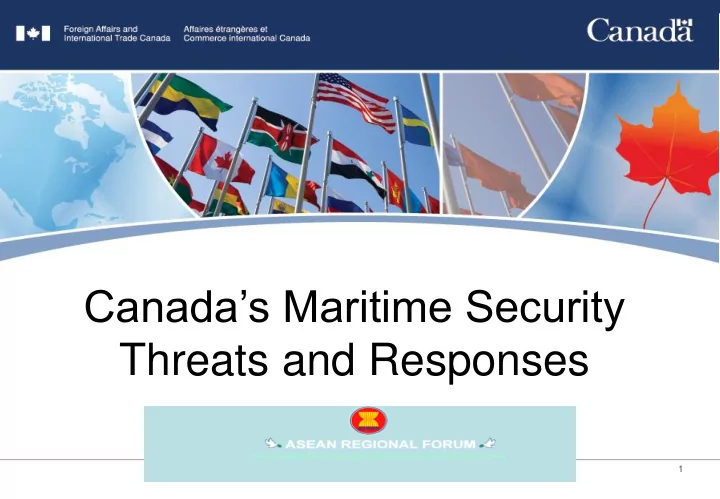

Canada’s Maritime Security Title Goes Here Threats and Responses 1
The Threat Environment • Constantly evolving and innovative terrorist and organized crime threats against marine transportation globally • 200,000 km of coastline - exploitable environment • Intimate linkages to other modes of transportation and the global economy • Marine transportation system can serve as a: - Potential Target - Conduit for an Attack - Weapon Canada’s Maritime Security Threats and Responses 2
Canada’s Response • Domestic policy and operational reorganisation • Bi-national cross-border teams • Capacity-building: domestic and international 3 Canada’s Maritime Security Threats and Responses
Domestic Response- Interdepartmental Marine Security Working Group (IMSWG) IMSWG ensures interdepartmental policy and regulatory coordination Promotes the whole-of-government approach and collaboration Incorporates and aligns with developing Government of Canada strategies and initiatives such as Canada’s National Security Policy, Canada-U.S. Beyond the Border Initiative, and Canada’s Northern Strategy 4 Canada’s Maritime Security Threats and Responses
Domestic Response- Marine Security Operations Centres Bring together all civilian and military resources necessary to respond to a marine security incident Information / intelligence fusion centres to support security, law enforcement and first responder communities with knowledge of marine threats Facilitate coordination of multi-agency on-water activities Co-located multi-agencies with legislative authorities Coordinate activities with US Coast Guard Operations Centres 5 Canada’s Maritime Security Threats and Responses
International Response - Cross-Border Teams SHIPRIDER • Specially trained and cross-designated Canadian and US law enforcement officers jointly crewing each other's vessels • Pilot projects conducted and evaluated (2005-2007) • Framework Agreement signed in May 2009 6 Canada’s Maritime Security Threats and Responses
Shiprider - Guiding Principles • Respect for sovereignty and fundamental rights and freedoms, notably privacy • Operations to be intelligence-driven, based on joint threat and risk assessments • Confined to shared waterways unless urgent and exceptional circumstances • Operations conducted under the direction of host country officers • Cross-designation/Reciprocal authorities Canada’s Maritime Security Threats and Responses 7
International Marine Security Capacity Building Goal: to broaden international consensus on marine security. Focus: establishing international standards, implementing capacity- building initiatives and sharing of transportation security best practices. Canada’s Maritime Security Threats and Responses 8
Capacity Building Programs • Aim to foster capacity among key beneficiary states and international organizations to address transnational security threats • Counter-Terrorism Capacity Building Program (CTCBP) – Focused on terrorism globally • Anti-Crime Capacity Building Program (ACCBP) – Focused on transnational crime in the Americas • Both address transportation security, with major partners including: ICAO, IMO, OAS-CICTE, UNODC 9 Canada’s Maritime Security Threats and Responses
Building Capacity in Maritime Security • Examples of eligible projects – Expert assistance: security audits, follow-up, legislative & regulatory assistance – Training: drills, exercises, standards development – Capabilities & equipment: communications, navigation, vehicles • To date, most of these activities have been undertaken in the Americas • Looking for future avenues of cooperation – Southeast Asia and Border & Transport Security are priorities for the CTCBP 10 Canada’s Maritime Security Threats and Responses
Looking ahead – Challenges facing Canada • Increasing access to the Northern Passage • Ratification of conventions and agreements • Reconciling capacity with authorities 11 Canada’s Maritime Security Threats and Responses
Thank you! For further information, please contact- Danica Doucette-Preville danica.doucette-preville@international.gc.ca 12 Canada’s Maritime Security Threats and Responses
Recommend
More recommend